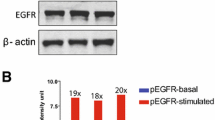Abstract
Purpose
Metastasizing epithelioid sarcoma (ES) is an extremely aggressive tumor, because conventional chemotherapy and irradiation are largely ineffective. Here, we analyzed the impact of the CD95-mediated drug-induced apoptosis in ES cell lines.
Methods
The effects of paclitaxel (Taxol®) and 5-FU were determined by MTT assay. The extent of apoptosis was analyzed by light microscopy and Annexin V staining (flow cytometry). The expression of death receptors and ligands was defined by RT-PCR, Western blotting and flow cytometry.
Results
All cell lines expressed CD95, but not the CD95 ligand. The CD95 activation resulted in apoptosis and cell death in all cell lines. Both paclitaxel and 5-FU are able to trigger apoptosis, and furthermore, to upregulate CD95, whereas only paclitaxel increases CD95 ligand expression. Neutralizing antibodies directed against CD95 ligand effectively inhibited paclitaxel-induced cell death, thereby providing evidence for a direct involvement of the CD95 system in paclitaxel-induced apoptosis.
Conclusions
Concomitant upregulation of CD95 receptor and ligand may significantly enhance the response of ES to anticancer drugs. As evident from the differential response of our clonal ES subpopulations to paclitaxel and 5-FU, effective activation of the CD95 system depends on intrinsic properties of both the chemotherapeutic agent and target cell population.






Similar content being viewed by others
References
Chase DR, Enzinger FM (1985) Epithelioid sarcoma. Diagnosis, prognostic indicators, and treatment. Am J Surg Pathol 9:241–263
Dejosez M, Ramp U, Mahotka C, Krieg A, Walczak H, Gabbert HE, Gerharz CD. (2000) Sensitivity to TRAIL/APO-2L-mediated apoptosis in human renal cell carcinomas and its enhancement by topotecan. Cell Death Differ 7:1127–1136
Eichhorst ST, Muller M, Li-Weber M, Schulze-Bergkamen H, Angel P, Krammer PH (2000) A novel AP-1 element in the CD95 ligand promoter is required for induction of apoptosis in hepatocellular carcinoma cells upon treatment with anticancer drugs. Mol Cell Biol 20:7826–7837
Engers R, Gerharz CD, Moll R, Pohl A, Sarbia M, Gabbert HE (1994) Interclonal heterogeneity in a human epithelioid-sarcoma cell line (GRU-1). Int J Cancer 59:548–553
Engers R, van Roy F, Heymer T, Ramp U, Moll R, Dienst M, Friebe U, Pohl A, Gabbert HE, Gerharz CD. (1996) Growth inhibition in clonal subpopulations of a human epithelioid sarcoma cell line by retinoic acid and tumour necrosis factor alpha. Br J Cancer 73:491–498
Enzinger FM (1970) Epitheloid sarcoma. A sarcoma simulating a granuloma or a carcinoma. Cancer 26:1029–1041
Evans HL, Baer SC (1993) Epithelioid sarcoma: a clinicopathologic and prognostic study of 26 cases. Semin Diagn Pathol 10:286–291
Friesen C, Herr I, Krammer PH, Debatin KM (1996) Involvement of the CD95 (APO-1/FAS) receptor/ligand system in drug-induced apoptosis in leukemia cells. Nat Med 2: 574–577
Fulda S, Sieverts H, Friesen C, Herr I, Debatin KM (1997a) The CD95 (APO-1/Fas) system mediates drug-induced apoptosis in neuroblastoma cells. Cancer Res 57:3823–3829
Fulda S, Friesen C, Los M, Scaffidi C, Mier W, Benedict M, Nuñez G, Krammer PH, Peter ME, Debatin KM. (1997b) Betulinic acid triggers CD95 (APO-1/Fas)- and p53-independent apoptosis via activation of caspases in neuroectodermal tumors. Cancer Res 57:4956–4964
Fulda S, Los M, Friesen C, Debatin KM (1998a) Chemosensitivity of solid tumor cells in vitro is related to activation of the CD95 system. Int J Cancer 76:105–114
Fulda S, Scaffidi C, Pietsch T, Krammer PH, Peter ME, Debatin KM (1998b) Activation of the CD95 (APO-1/Fas) pathway in drug- and gamma- irradiation-induced apoptosis of brain tumor cells. Cell Death Differ 5:884–893
Gerharz CD, Ramp U, Dejosez M, Mahotka C, Czarnotta B, Bretschneider U, Lorenz I, Müller M, Krammer PH, Gabbert HE. (1999) Resistance to CD95 (APO-1/Fas)-mediated apoptosis in human renal cell carcinomas: an important factor for evasion from negative growth control. Lab Invest 79:1521–1534
Halling AC, Wollan PC, Pritchard DJ, Vlasak R, Nascimento AG (1996) Epithelioid sarcoma: a clinicopathologic review of 55 cases. Mayo Clin Proc 71:636–642
Muller M, Strand S, Hug H, Heinemann EM, Walczak H, Hofmann WJ, Stremmel W, Krammer PH, Galle PR. (1997) Drug-induced apoptosis in hepatoma cells is mediated by the CD95 (APO-1/Fas) receptor/ligand system and involves activation of wild-type p53. J Clin Invest 99:403–413
Reinecke P, Knopf C, Schmitz M, Schneider EM, Gabbert HE, Gerharz CD (2000a) Growth inhibitory effects of paclitaxel on human epithelioid sarcoma in vitro: heterogeneity of response and the multidrug resistance phenotype. Cancer 88:1614–1622
Ross HM, Lewis JJ, Woodruff JM, Brennan MF (1997) Epithelioid sarcoma: clinical behavior and prognostic factors of survival. Ann Surg Oncol 4:491–495
Stumm S, Meyer A, Lindner M, Bastert G, Wallwiener D, Gückel B. (2004) Paclitaxel treatment of breast cancer cell lines modulates Fas/Fas ligand expression and induces apoptosis which can be inhibited through the CD40 receptor. Oncology 66:101–111
Wang TH, Popp DM, Wang HS, Saitoh M, Mural JG, Henley DC, Ichijo H, Wimalasena J. (1999) Microtubule dysfunction induced by paclitaxel initiates apoptosis through both c-Jun N-terminal kinase (JNK)-dependent and -independent pathways in ovarian cancer cells. J Biol Chem 274:8208–8216
Wang TH, Wang HS, Soong YK (2000) Paclitaxel-induced cell death: where the cell cycle and apoptosis come together. Cancer 88:2619–2628
Acknowledgments
This work was supported by a grant from the ‘Dr.-Mildred-Scheel-Stiftung für Krebsforschung’. This work was a part of the diploma thesis of Mr. Krystian S. Matuszek.
Author information
Authors and Affiliations
Corresponding author
Rights and permissions
About this article
Cite this article
Heikaus, S., Matuszek, K.S., Suschek, C.V. et al. Paclitaxel (Taxol®)-induced apoptosis in human epithelioid sarcoma cell lines is enhanced by upregulation of CD95 ligand (FasL/Apo-1L). J Cancer Res Clin Oncol 134, 689–695 (2008). https://doi.org/10.1007/s00432-007-0340-8
Received:
Accepted:
Published:
Issue Date:
DOI: https://doi.org/10.1007/s00432-007-0340-8




